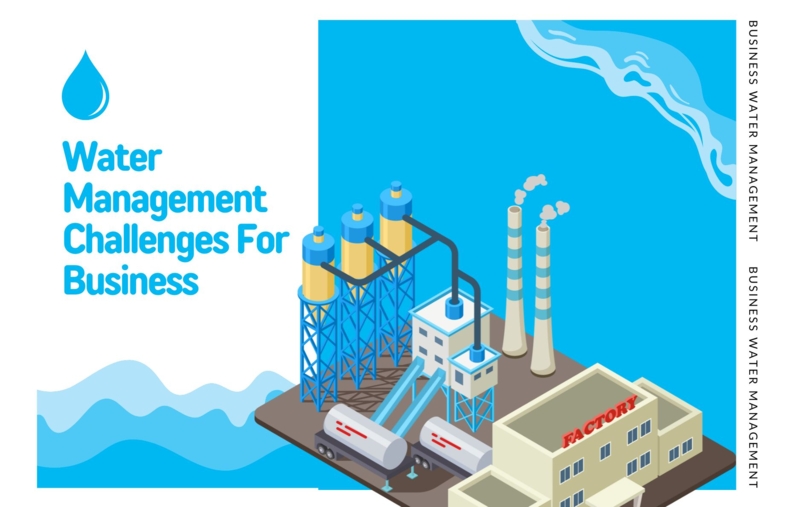Water Management Challenges For Business
Published on by Shibani Thakur, waterapp2021@gmail.com in Business
Water management is essential to running a business because it affects things like ecology, following the rules, and how efficiently the business runs. In today's world, companies need help saving and using water. To solve these problems and ensure resources are managed responsibly, we need to use new Water Technology like water level monitors.

Challenges in Water Management
When businesses try to manage water supplies well, they face several significant problems:
Water Scarcity and Resource Management
Issue: Many places are having trouble getting enough water due to climate change and population growth.
Impact: Businesses need to use water best to keep running and meet their environmental goals.
Solution: Tools in Water Technology, such as water level sensors, can be used to monitor and manage water resources effectively, preventing waste and promoting long-term use.
Regulatory Compliance
Issue: Businesses must obey tight water use, dump, and environmental impact standards.
Impact: Not following the rules can cause fines, legal problems, and damage your image.
Solution: Water Technology solutions, such as high-tech sensors, help businesses keep track of and report correctly on how much water they use, making sure they follow the rules.
Operational Efficiency and Cost Management
Issue: A problem with working efficiency and cost management is that bad water management can lead to higher costs and wasted resources.
Impact: Improving how much water is used cuts costs and generally makes operations run more smoothly.
Solution: Water Level Sensor for Business is vital for real-time monitoring of water levels. This lets companies find leaks, stop overflows, and use water best in cooling systems and manufacturing.
Role of Water Technology
Water Technology, which includes new ideas like water level sensors, solves these problems by giving us helpful information and making it easier to handle water effectively:
Water Level Sensors: Monitoring and Control
Water Level Sensor for Business helps monitor reservoirs, tanks, and other water levels. These sensors provide real-time data, allowing businesses to:
- Monitor water consumption patterns correctly.
- Quickly find leaks and possible spills.
- Find the best ways to use water in farming and commercial settings.
For example, in agriculture, Water Level Sensor for Business helps determine the best times to water crops based on how wet the soil is. This increases fruit yields while saving water. In industry, these sensors ensure that cooling systems work efficiently, cutting down on water use and the associated costs.
Data-Driven Decision Making
Water Technology makes it easier to collect and analyze data, which lets businesses make smart choices about how to handle water:
Advanced analytics help find patterns in how much water is used and the best way to distribute resources.
Predictive maintenance cuts down on downtime and stops expensive machine failures before they happen.
Real-time monitoring lets you respond quickly to water-related situations, which keeps your business running.
Risk Mitigation and Sustainability
Water Level Sensor for Business helps find water leaks and other problems early, lowering the risk of damage to property and the environment. Businesses that use sustainable water management practices improve:
- Their environmental and social responsibility.
- Long-term savings on costs and better management.
- Meeting the rules and standards set by the government and the business.
Problems with Adoption
Even though Water Technology options have benefits, businesses may face problems when they try to use them:
Cost Considerations
The initial investment costs for installing water level sensors and connecting them to current systems can be high. But these costs are worth it in the long run because they save money on water use and make operations more efficient.
Technological Complexity
Connecting water level sensors to IoT platforms and data analytics tools requires technical know-how and resources. Businesses may need to spend money on training and assistance to get the most out of these technologies.
Regulatory Compliance Challenges
Businesses face compliance issues when they must follow changing regulatory requirements, such as limits on water use and discharge rules. Water Technology Solutions must comply with these rules and regulations to avoid fines and legal trouble.
Looking to the Future
The future of business water control depends on water technology that keeps getting better:
- Improvements in sensor technology will make water level monitors more accurate, reliable, and valuable, allowing them to be used in more fields.
- Using IoT platforms and AI algorithms together will make it possible for water management processes to use predictive analytics and make decisions on their own.
- Businesses will emphasize sustainable water management practices to meet environmental goals, improve their reputation, and stay ahead of the competition.
Taxonomy
- Water Scarcity
- Water Harvesting
- Water Monitoring
- Water Conservation